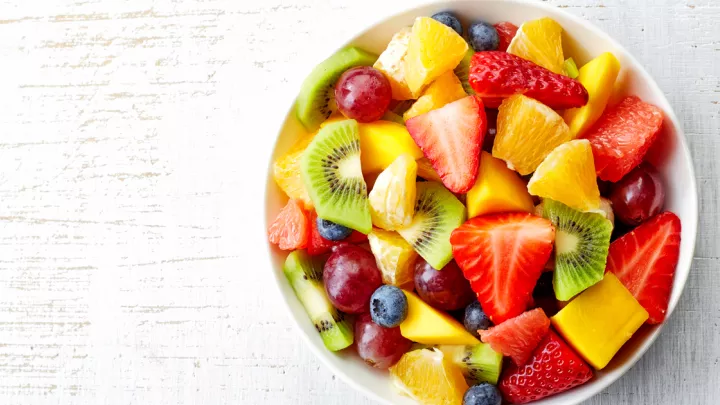You asked, we answered: Does sugar feed cancer?

By Eileen Moran, medical nutrition graduate student
You may have heard that sugar feeds cancer. The body needs sugar for energy. While cancer can use this energy, too, there’s more to the story.
Luckily, the only type of sugar intake shown to increase the risk of developing cancer is added sugars in high amounts. Added sugar is sugar that has been added during the processing of food to make it sweeter, like sweetened cereals, granola bars or drinks.
What is sugar?
Sugar is a simple carbohydrate, meaning it is made up of just one or two of the most basic building blocks of carbohydrates: glucose, fructose and galactose. These appear in our diets as table sugar, honey and sugar found naturally in fruit and milk.
Your body can easily and rapidly use simple carbohydrates for energy. Complex carbohydrates, on the other hand, are large networks of the simple building blocks, like starches and fiber, that take your body longer to break down and use. Think of it as Lego pieces versus a completed Lego project!
A diet high in simple carbohydrates, or sugar, may lead to weight gain and high blood sugars. This can increase the risk of cancer and cancer complications.
Simple carbohydrates include:
- Candy
- White flour (pasta and bread products)
- Pastry items
- Juice and sugar-sweetened drinks
By contrast, a diet high in complex carbohydrates can aid in maintaining a healthy weight and consistent blood sugar levels.
Complex carbohydrates include:
- Vegetables
- Sweet potatoes
- Whole grains, like oatmeal, quinoa, and brown rice
- Beans, chickpeas, and lentils
Should I quit eating sugar?
Cutting sugar from your diet entirely is likely impossible, as it is found naturally in many nutrient-rich foods, including fruit, dairy, vegetables and grains. Instead, reducing added sugars can help you eat in a more healthful way.
The American Heart Association recommends men eat 36 grams or less of added sugar each day and women eat 25 grams or less per day. Check the nutrition facts label for the added sugar in a food or drink.
Items high in added sugar are:
- Soda and other sugar-sweetened drinks
- Sweetened dairy products (some yogurts, flavored milks or creamers)
- Sweets
- Some condiments
- Other processed food items
In addition to lowering your added sugar intake, be sure to eat a varied diet that incorporates:
- Protein
- Whole grains
- Beans
- Fruits
- Vegetables
- Healthy fats
Proven strategies to reduce cancer risk
The Cancer Risk and Prevention Clinic can assess your cancer risk and offer a personalized plan to prevent cancer. Call 402.559.5600 to schedule an appointment.







